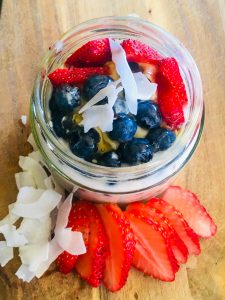This Bircher Muesli is a great time saving breakfast option for my clients that handle oats. It can be made in advance and serves as a quick portable option for those that like to take their breakfast with them to work.
Okay so it’s inexpensive, convenient, quick and easy to make.
Sounds good so far yes?

Microbiome-friendly Bircher Muesli
So what is it that makes it so good for your gut?
Oats contain beta-glucan, a soluble dietary fibre that acts as a prebiotic in your gut. Put simply research has shown oats act as a fuel source for the good bacteria in your gut. Consuming your oats raw also has a lower GI as opposed to cooked oats, meaning a slower glucose response to raw oats and more stable blood sugars.
Chia seeds and flaxseeds contain soluble fibre, apple is rich in pectin and the fresh fruit (especially if you choose berries) are great for additional fibre, antioxidants and polyphenols to support microbiome health as well. Coupled with a little fermented product (yoghurt) it’s a lovely start to your day. A good make ahead option for those who can tolerate a little oats.
Many Bircher muesli recipes will soak in juice overnight- there is really no need for this and just ups the sugar content of your breakfast significantly.
Here is my base recipe. Feel free to adjust the nuts, seeds and extras based on your preference and personalised food tolerance.
Microbiome-friendly Bircher Muesli
Ingredients
2 cups rolled oats (I used certified wheat-free)
1 green apple, grated
1 teaspoon ground cinnamon
1 tablespoon chia seeds
1 tablespoon flaxseeds
1 tablespoon shredded coconut
2 tablespoons sunflower seeds
2 tablespoons sesame seeds
Juice of 1 lemon
1 cup filtered water
1 cup milk of choice (I used almond)
To serve:
Yoghurt (I use coconut, or occasionally sheep)
Chopped fresh fruit of choice (berries are rich in microbiome-feeding polyphenols)
A drizzle of honey or maple syrup (optional)
Making your Bircher Muesli
Mix the dry ingredients in glass dish with a lid. Add the lemon juice, grated apple, water and milk and give it a good stir. Pop on the lid and place in the fridge to soak overnight. Alternatively you can portion out into clean glass jars now to prep ahead.
To serve, drizzle with a little honey (if using) and top with yoghurt and fresh fruit of choice.
The bircher muesli will keep for several days in the fridge to make for quick, even portable breakfasts.
Quick Tip:
You can also premix a bulk quantity of the dry ingredients in a glass jar to save time. Simply portion out a cup or two of your dry mix into another container and add the wet ingredients to make a few serves at a time.
When to exercise caution with oats
While oats don’t officially contain gluten, they are often contaminated by neighboring crops or through processing on the same equipment as other grains. Overseas (US, UK and EU) oats are often labelled gluten free. Their labeling laws allow gluten to be present up to 20ppm. In Australia our labeling laws are stricter, and for something to be labelled gluten free requires “nil detected gluten”.
Certified clean oats can therefore usually be handled by those with gluten intolerance. In Australia a brand called “Gloriously Free” have oats with nil detected gluten. However our labeling laws still exclude them from being labelled gluten free.
Some people also react to another protein unique to oats called avenin. It’s distantly related to gluten. Coeliac Australia has this to say about consuming oats in coeliac disease:
“Many studies confirm that pure (uncontaminated) oats are safely tolerated by most people with coeliac disease. However, in some people with coeliac disease, oat consumption can trigger a potentially harmful immune response. Because of this, the current recommendation is that oats not be included as part of a gluten free diet.
The absence of adverse symptoms or coeliac antibody changes when consuming oats does not necessarily indicate they are safe; bowel damage can still occur without symptoms or detectable coeliac antibodies being present.”
Lastly, some of you with FODMAP sensitivity may need to exercise caution with oats.
When it comes to FODMAPS, oats contain oligosaccharides and GOS. However many of those with FODMAP sensitivity will still tolerate them OK, they just need to be mindful of their portions. Depending on your source, 1/2 cup is usually fine, (though Monash has 1/2 cup as moderate for oligosaccahrides) and 1/4 cup is low in all types.
Share the love

About Sandi
Sandi Cooper is an experienced Naturopath working in clinical practice for almost two decades. Her clients love her down-to-earth approach and her naturally caring qualities. Although Sandi is experienced in most areas of clinical practice, she has a special interest in children’s health and nutrition, working with parents to get the best outcomes for their children.



